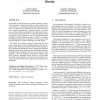Free Online Productivity Tools
i2Speak
i2Symbol
i2OCR
iTex2Img
iWeb2Print
iWeb2Shot
i2Type
iPdf2Split
iPdf2Merge
i2Bopomofo
i2Arabic
i2Style
i2Image
i2PDF
iLatex2Rtf
Sci2ools
103
click to vote
PODS
2008
ACM
2008
ACM
Data exchange and schema mappings in open and closed worlds
In the study of data exchange one usually assumes an openworld semantics, making it possible to extend instances of target schemas. An alternative closed-world semantics only moves `as much data as needed' from the source to the target to satisfy constraints of a schema mapping. It avoids some of the problems exhibited by the open-world semantics, but limits the expressivity of schema mappings. Here we propose a mixed approach: one can designate different attributes of target schemas as open or closed, to combine the additional expressivity of the open-world semantics with the better behavior of query answering in closed worlds. We define such schema mappings, and show that they cover a large space of data exchange solutions with two extremes being the known open and closed-world semantics. We investigate the problems of query answering and schema mapping composition, and prove two trichotomy theorems, classifying their complexity based on the number of open attributes. We find c...
Related Content
| Added | 08 Dec 2009 |
| Updated | 08 Dec 2009 |
| Type | Conference |
| Year | 2008 |
| Where | PODS |
| Authors | Leonid Libkin, Cristina Sirangelo |
Comments (0)

